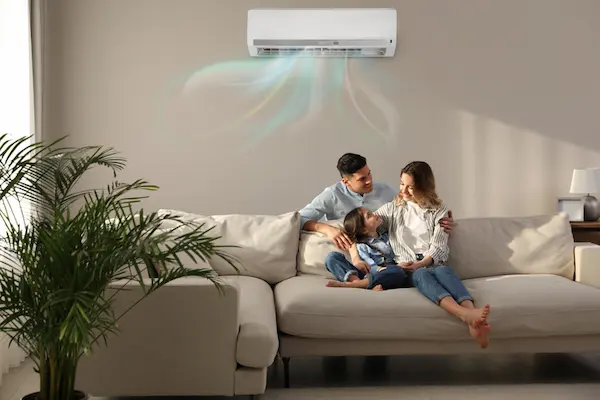DIY Troubleshooting Tips for 7 Common HVAC Issues

Keep Your Flagstaff Home Comfortable Year-Round
Ensuring that your HVAC (Heating, Ventilation, and Air Conditioning) system runs smoothly is crucial for maintaining a comfortable home environment. When temperatures in Northern Arizona swing from sweltering summer highs in Sedona to freezing winter lows in Flagstaff, a reliable HVAC system is not just a luxury—it’s a necessity.
Regular maintenance of your HVAC system can save you a lot of headaches and money in the long run. It not only ensures the efficiency and longevity of your system but also helps prevent unexpected breakdowns. By learning some basic troubleshooting skills, you can address minor issues before they escalate into major problems.
In this blog post, we’ll explore some common HVAC issues and offer practical, do-it-yourself troubleshooting tips. With expert advice from Aire Serv of North Central Arizona, you’ll be well-equipped to handle minor problems and know when it’s time to call in the pros.
Common HVAC Issues Homeowners Face
1. Inconsistent Heating or Cooling
One of the most common complaints is inconsistent temperatures within the home. This issue can stem from several causes, including blocked vents, dirty filters, or malfunctioning thermostats. Inconsistent heating or cooling can significantly impact your comfort and energy bills.
2. Unusual Noises
Hearing strange noises like banging, rattling, or squealing from your HVAC system? These sounds often indicate loose components, motor issues, or debris in the system. Ignoring unusual noises can lead to more severe damage over time.
3. Frequent Cycling
If your HVAC system turns on and off frequently, it could be due to a malfunctioning thermostat, poor airflow, or an oversized system. Frequent cycling can wear out your system prematurely and drive up energy costs.
4. Weak Airflow
Experiencing weak or limited airflow through your vents can be frustrating. This issue is often caused by clogged filters, ductwork problems, or failing motors. Reduced airflow can make your HVAC system work harder, leading to increased wear and tear.
5. Water Leaks
Water leaks around your HVAC unit can indicate issues with the condensation line, refrigerant levels, or even the evaporator coil. Left unchecked, these leaks can cause significant water damage to your home.
6. High Energy Bills
Notice a sudden spike in your energy bills? This could be a sign that your HVAC system is running inefficiently due to dirty filters, low refrigerant levels, or aging components. High energy consumption not only affects your wallet but also the environment.
7. Unpleasant Odors
Foul smells emanating from your HVAC system can be a red flag. These odors often result from mold or mildew growth, burnt-out components, or gas leaks. Addressing unpleasant smells promptly is essential for your health and safety.
DIY Troubleshooting Tips for Common HVAC Issues
1. Check and Replace Filters
Dirty filters are a common cause of HVAC issues. Check your filters monthly and replace them every 1-3 months to ensure proper airflow and system efficiency.
2. Inspect and Clear Vents
Blocked vents can lead to inconsistent temperatures. Ensure all vents are open and unobstructed by furniture, rugs, or other items. This allows for optimal airflow throughout your home.
3. Test Your Thermostat
A malfunctioning thermostat can disrupt your HVAC system’s performance. Test your thermostat by setting it a few degrees higher or lower than usual and observing the system’s response. If it’s not working correctly, consider replacing the batteries or the thermostat itself.
4. Clean the Condenser Coils
Dirty condenser coils can reduce your system’s efficiency. Turn off the power, then clean the coils with a garden hose and a soft brush. Keeping the coils clean helps maintain proper heat exchange.
5. Clear the Area Around the Outdoor Unit
Debris, leaves, and overgrown plants can obstruct your outdoor unit. Keep the area clear to ensure adequate airflow and prevent potential damage to the unit.
6. Check for Air Leaks
Inspect your ductwork for visible leaks and seal any gaps with duct tape or mastic sealant. Sealing air leaks improves system efficiency and reduces energy consumption.
7. Address Water Leaks Promptly
If you notice water pooling around your HVAC unit, check the condensation line for blockages. Clear any obstructions to prevent water damage and ensure proper drainage.
When to Call in the Pros
While DIY troubleshooting can address many minor HVAC issues, some problems require professional expertise. If you encounter any of the following situations, it’s time to call Aire Serv of North Central Arizona:
- Persistent issues despite your troubleshooting efforts
- Electrical problems or frequent tripping of circuit breakers
- Refrigerant leaks or low refrigerant levels
- Complex mechanical issues or unusual noises
Our team is available 24/7 to provide prompt and reliable HVAC services, ensuring your system runs smoothly and efficiently.
Invest in Regular Maintenance
Regular maintenance is key to preventing HVAC issues and extending the lifespan of your system. Aire Serv of North Central Arizona offers comprehensive maintenance plans to keep your unit in top condition. Our services include routine inspections, cleaning, and tune-ups to ensure optimal performance.
Ready to take the next step in maintaining your home’s comfort? Don’t hesitate to reach out for professional support and enjoy the peace of mind that comes with a well-maintained HVAC system. Your satisfaction is our top priority.
Request an appointment today for comprehensive HVAC services in Flagstaff, Sedona, Prescott, and Camp Verde.
 Click to call
Click to call


